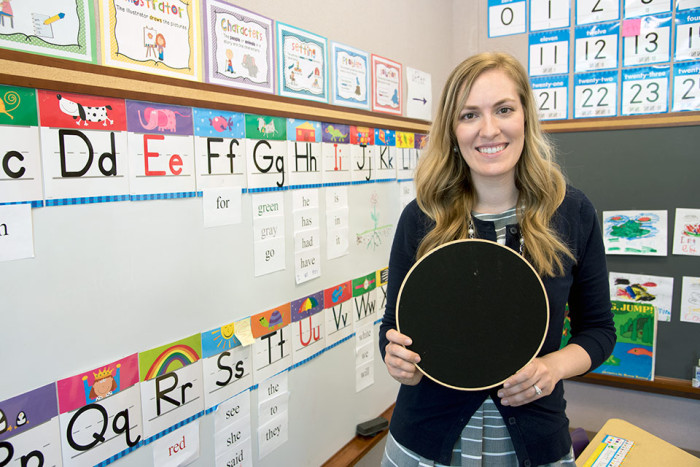Aimee Gao
After graduation, Aimee Gao will take her training and research experience – and a passion for building self-efficacy in deaf children – into the classroom

Aimee Gao, shown in a classroom at the Central Institute for the Deaf on the Medical Campus, holds a speech hoop, a tool teachers of the deaf use to cover their mouths during auditory training. Use of the tool encourages students to strengthen their auditory channels. Gao, who soon will receive a master’s degree in deaf education through the Program in Audiology and Communication Sciences, will teach at the school in the fall. <em>Photo: Robert Boston</em>
Aimee Gao’s interest in deaf culture was first piqued in fourth grade, when her class learned the story of Helen Keller, dabbled in American sign language and put on a play for students at the Kansas School for the Deaf. Later, as an undergraduate at William Jewell College, where she earned a degree in elementary education, her interest was piqued a second time.
“My college roommate had a sister who was deaf,” Gao said. “An interest in deaf culture was always in the back of my mind, and this brought it into my life again.”
Her interest combined with a passion for teaching explains how Gao came to pursue a master’s degree in deaf education through Washington University School of Medicine’s Program in Audiology and Communication Sciences (PACS). She will graduate in May and has accepted a position teaching preschool at the Central Institute for the Deaf on the Medical Campus.
“I’m looking forward to taking all the knowledge and great ideas I’ve learned in the PACS program and applying that in real life,” Gao said. “It will be nice to create a classroom community again.”
Indeed, Gao is no stranger to creating classroom communities, with teaching stints in Missouri, Kentucky and Belgium before coming to Washington University.
While earning a master’s degree in education at the University of Missouri, Gao taught third- and fourth-graders. Pursuing a desire to live overseas, she applied for international teaching positions and spent two years at the International School of Brussels, where she taught third-graders, many of whom did not speak fluent English.
Gao explained that the Central Institute for the Deaf curriculum does not include sign language and instead focuses on helping students learn to use various listening devices such as hearing aids, cochlear implants or other technology, to develop speech and language skills.
“We teach the students how to use their devices to listen and make meaning of the sounds,” she said. “Most children who are born deaf or hard of hearing have parents who are both hearing. If listening and spoken language is in the home, we want the kids to be able to access that. It’s best for brain development to get this as early as possible, to stimulate the auditory nerve and help them develop language.”
Gao has been able to pursue research and experiences beyond the typical curriculum. She joined a research team studying brain function in children who are deaf or hard of hearing. And she also is investigating self-efficacy beliefs of adolescents who are deaf or hard of hearing.
“Self-efficacy is the perception you have of your personal capabilities,” she said. “How well can you learn math? How well can you use the library? A lot of the current literature on deafness looks at what the parents believe or what the teacher believes the child is capable of. There is very little information about how these children rate themselves. I’m interested in finding out if these children’s beliefs differ from those of their hearing peers.”
With her research focused on older children, it may seem counterintuitive that Gao soon will begin teaching preschoolers. But she has good reason.
“I want to see what we can do in early childhood to support self-efficacy beliefs,” she said, “so that when these students reach adolescence, they already feel confident in their abilities and can reap the benefits of that.”







